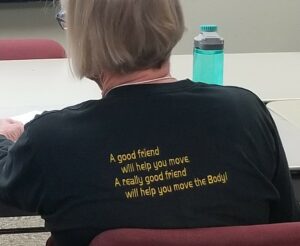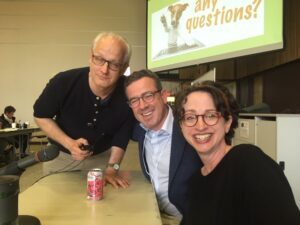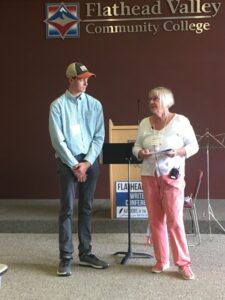What the well-dressed crime novelist wears to a writers conference.
If you’ve attended writing conferences, you likely had a great time. You chatted with fellow authors, learned about craft, picked up marketing tips, and made important contacts with editors and agents. Organizers strive to make the schedule seamless, the meals hot and tasty, the speakers interesting.
Everything probably ran smoothly and you walked away happy.
You never saw the drama behind the scenes.
And that’s how it should be.
But making it look easy requires lots of preparation plus the ability to drop back and punt when circumstances go awry.
The 29th Annual Flathead River Writers Conference wrapped this past weekend. By all accounts, attendees went home happy, loaded with new tools, inspiration, and fresh energy.
The speakers were excellent as well as great fun, as this photo shows. Mugging for the camera is Jeff Giles, Vanity Fair Hollywood editor, Simon & Schuster editor Ben Loehnen, and Haven Kimmel, author of A Girl Named Zippy.
As a conference committee member and sometimes co-chair, I’ve worked many of those 29 events.
Some years are a blast. Other years, s**t happens.
Manuscript evaluations by editors and agents are always major draws for attendees. Slots fill fast and the back-up wait list is long.
This year, three weeks before the conference, the guest agent suffered a family medical emergency. He remained hopeful he could still attend but the outcome was too uncertain to predict. We told him to take care of his family and that we would find a replacement.
We organizers felt terrible for him. But we also had 100+ attendees to worry about. Many travel from other states and expect to hear an agent. We had to deliver. Out went a wild flurry of phone calls and emails.
But…August is traditional vacation time in the publishing industry. Some were out of the office and unplugged. Others already had commitments and couldn’t come on such short notice.
As our panic grew and time evaporated, a hero stepped up. A couple of years before, Barbara Schiffman had been a big hit at our conference. She’d worked for decades in the Hollywood film industry, doing story analysis and script evaluation for producers. Recently, she semi-retired and moved to nearby Whitefish, Montana. She graciously agreed to substitute, including doing manuscript critiques.
Whew! Saved!
One year, a much-anticipated horror author was sidelined by airline snafus. She departed New Orleans on Friday morning and was supposed to arrive in Montana by 4 p.m. in time for the welcome dinner for speakers.
At noon, she called from Houston where she was stuck. A weather system caused a domino effect, delaying all flights. The poor woman spent nine hours in the Houston airport trying to reschedule. The upshot: the airline could deliver her to Montana at midnight the following day…after half the conference was over. She wound up going home to New Orleans, unfortunately with a new horror story to tell.
Years ago, a renowned true crime author agreed to present. We were over the moon to have such a big name. Registrations poured in. Even non-writers paid to hear her speak.
But…she was a nervous flyer. First, she said she’d drive. Then she decided her health wasn’t good enough to drive. Could she take a train? I looked into arrangements but the cost was four times that of a plane ticket. Our group is nonprofit and the money for a train ticket wasn’t there.
She nearly backed out several times. I spent hours on the phone with her, trying to reassure her. Finally she gathered her courage and got on the plane.
She was a huge hit–the attendees were thrilled. Best of all, she herself had a fabulous time and loved every minute.
At the end of the conference, she clasped my hands and said, “I am SO glad I came! This is the best conference I’ve ever been to. And to think I almost didn’t come.”
Whew!
Most speakers are wonderful, gracious people who want to help other writers. In 29 years, I can count the clinkers on the fingers of one hand. But those few clinkers really leave an impression.
One year, a big-name mystery author was supposed to teach a three-day intensive workshop. He showed up with his girlfriend and they were fighting. He then told us he shouldn’t have come because he was on deadline.
Uh, you didn’t know that when you committed to teach?
The first morning, he grumbled and complained for three hours to his students about his deadline and troubles with his girlfriend. After lunch, he pitched a fit, saying he couldn’t possibly write in his hotel room because his girlfriend was irritating him. “I’m not hard to please,” he claimed, “just find me a quiet place with a table.” So I found several alcoves in the hotel where he could write. He couldn’t stand any of them.
The second morning, more whining, no teaching. Students were irritated and their complaints were totally valid.
The third morning, he put in a halfhearted effort to review a few manuscripts but the class was a disaster. We wound up refunding tuition to his disappointed students.
At the party on the last evening, in front of everyone, he apologized to me for his behavior and presented me with a T-shirt…that advertised his books.
Can you spell E-G-O?
Hiccups aren’t always with speakers. Once in a while, volunteers throw sand in the gears. One member was obsessed with finding an agent. He found out when the agent’s flight was scheduled to arrive, even though someone else had been assigned to do airport pickup. He showed up early, grabbed the agent, took him out to dinner, and badgered him for three hours about representation.
This happened before cell phones so we couldn’t call the agent. We knew he’d arrived on the plane but he’d disappeared. No one could find him.
Finally, the dazed agent arrived at the hotel. He told us he wasn’t thrilled that we’d sent this obsessed writer to pick him up. We apologized profusely and explained the guy had acted on his own, totally without our knowledge. Fortunately, the agent had a sense of humor. He probably told that story at future conferences as a cautionary tale of how not to impress an agent.
Needless to say, the kidnapper didn’t receive an offer of representation.
For every horror story, there are at least a hundred tales of writers who were inspired to finish a book, take the plunge into publication, or step up to the next level in their careers.
This year, attendees came from all over Montana, as well as Texas, California, Indiana, Iowa, Colorado, Missouri, Arizona, and Canada.
Several young writers were at their very first conference, including a 16-year-old filmmaker. Gabe Grende is a local high school student who started working in video six years ago. He recently attended a film school taught by Michael Polish and Kate Bosworth. Gabe so impressed Michael that Michael took him to Puerto Rico for a location shoot of a Mel Gibson movie.
Gabe agreed to film our conference and we can’t wait to see the finished product.
Meeting a student who’s eager and already accomplished at a young age gives all of us hope and inspiration.
Writing conferences are lots of work. Are they worth it?
Oh, yeah!
~~~
TKZers: What’s the best lesson you learned at a conference?
If you’ve volunteered, how did working behind the scenes increase your understanding of the business?
~~~
Debbie Burke’s new thriller Stalking Midas is available here.





Hey Debbie,
Thanks for this overview. I totally agree with you. It is hard work to bring details together but well worth the effort. Meeting with other writers and hearing from experts energizes my writing.
BJK
Betty, you are the queen of hard work and a terrific conference chair!
As I’ve grown as a writer, my needs and takeaways from conferences have changed. Early on, it was exciting to be surrounded by people who “got it” and everything was a learning opportunity. As time went on, the ROI diminished as I found I could have taught many of the workshops I was attending. Plus, once I moved into indie publishing, the agent/editor/publishing meetups were no longer an attraction. I reached the point where if I didn’t have an opportunity to present in some fashion, it wasn’t worth time and expense. Now, I tend to base my conference attendance on things like keynote speakers and workshops given by people I admire. (Yes, that’s why I was at Colorado Gold and Pikes Peak Writers, James Scott Bell and John Gilstrap.)
Terry, you are so right about takeaways changing over time as your career develops.
CO Gold and PPWC are two of my favorite conferences. Great memories from several years ago of having champagne with an FBI agent and a forensic anthropologist while listening to their amazing stories. http://www.debbieburkewriter.com/champagne-with-the-fbi/
Debbie –
I’ve attended the Flathead River Writers Conf for 12-13 years—this was the best so far. Your descriptions of what could go wrong only make it more amazing when events run smoothly.
Thanks for your hard work!
Thanks, Ann! So glad you enjoyed it. The speakers were stellar.
Back in the day (when dinosaurs roamed the earth), my mother gave me a trip to the University of Oklahoma’s writers conference.
In the same room, Foster-Harris, Dwight V. Swain, Jack Bickham, and a New York agent whose main contributions to the conference were his complaints about the heat, and university cafeteria food.
But amongst all the speakers (some really good ones), was a cute housewife, a petite redhead with a page boy cut, who told of her daily charge at the responsibilities for home, husband, children, church, a dog named Dog, and finding time to write confessions stories. (A john-raw that no longer exists, and which I miss a lot.)
Her account of constructing the tales of home, hearth, and sin intrigued me. So much so that I decided to learn how to write confession stories.
Took me a couple of years, but my first professional sales were confession stories. In those days, one or more $250 checks were a blessing, despite the inconvenience (I realize now) of carbon copies, actually having to remember to buy carbon paper, and having to decide how many copies one could actually get from on sheet of carbon paper.
Things my editors would tell me were how crisp my characters were, how good my dialog-to-character was. It was a joy to correspond with them.
Alas, like the dinosaurs, confession stories and magazines, without the hurly-burly of a meteor strike in the Gulf of Mexico, have disappeared. Confession stories were fun to write, and fun to construct.
I don’t remember the housewife-speaker’s name (and, of course, like most guys, I keep nothing important–my wife has things from prom night and bridal showers she attended) so I have no way of finding out who she was. (The University can barely find my transcript, so I know it’s no use going into their archives.)
But she was the person, aside from Foster-Harris, whose classes I got to take when I enrolled as a special student a couple of years later, relocating my family to Norman, who had the most impact on my career and writing life.
In her speech, the housewife told me something I said I’d never forget. I’ve forgotten what it was, but it was important.
And I got it at a great writers conference.
Jim, your line about forgetting the important thing you learned cracked me up b/c I do the same thing!
The problem with conferences is too much great info and too small a brain to stuff it into all at once.
Swain and Bickham at the same time! I’m envious.
Thanks for a great conference story.
Years ago, I worked on the SleuthFest conference, so I appreciate what you’ve had to go through. We had a speaker — a big name — who at the last minute said she was too afraid to give her talk. We had to scramble to find another speaker. I’ve met lifelong friends at conferences. It’s fun and relaxing to meet with other writers.
Elaine, most authors are consummate pros but once in a while–sheesh!
I too have met lifelong friends at conferences. That is the only time we see each other but we pick up right where we left off.
When I first started attending conferences I always signed up to work at the registration table. It was a great way to put faces to the names of writers. You can learn a lot about people by the way they treat volunteers. Just saying…
God bless every person who takes the time to organize conferences. Like you, they are the true heroes!
I love hanging out with readers and writer friends that I don’t get to see very often. Being on panels and signing books are just the icing on the cake. One thing that makes me sad is how cliquish conferences can be. It’s understandable that folks who are highly recognizable value private time with their friends just like the rest of us, but some handle their fans much more graciously than others.
Laura, I too enjoyed working the registration table for the same reasons. You’re so right about how people treat volunteers.
Many years ago, I met Sue Grafton at Bouchercon in Pasadena. At that point, she’d only written up to “D” or “E” but was already very successful and well-known. I’ll always remember how warm and lovely she was to her fans (including me).
Oh, wasn’t she nice?! I did a small event in Owensboro, Ky about eight years ago, and she crept into a workshop I was leading (waaaay oversubscribed–there were 20 people all in a circle, and I was told there would be 5 or 6!). She tiptoed over to the open chair next to me, and just smiled and sat down. I have little memory of the following 45 minutes but I’m sure I babbled like an idiot!
Laura, I expect what you call babbling was articulate and intelligent.
Thanks for this great post, Debbie. I’ve recently published a list of WRITERS CONFERENCES and BOOK FESTIVALS in 2019-2020. I missed the Flathead River one and will go add it now. Here’s the link, in case anyone would like to check out the list and maybe suggest other conferences or festivals to add: https://jodierennerediting.blogspot.com/2019/09/writers-conferences-book-festivals-2019.html
Thanks.
Thank you, Jodie! Really appreciate the shout-out for next year–our 30th anniversary.
You’ve compiled a huge, wonderful list that made me drool. If only time and money permitted….
I agree! But I hope to make it to a few of them. The problem is in choosing which ones! 🙂
I helped organise a seminar- a one-and-a-half day event for local writers. That was hard work- lots of deadlines, offers, rejections from presenters, accommodation arrangements. I can’t imagine what it’s like to get a full conference off the ground. But, watching it all come together, to meet new people, to get to know presenters– it was something special.
However, the best lesson I learned at a conference was that people are willing to go out of their way to help. The first conference I went to started out wonderfully. I went up with a friend of mine and we had a fantastic Thursday and Friday night- meet and greets, talking to established authors who offered sage advice, and people generally were incredibly friendly. Then, Saturday morning before the workshops started, I got a phone call to say my father-in-law passed away quite suddenly. I was four hours away by car, so needed to get on the road– fast.
Several of the writers who were volunteering calmed me down, helped get me organised to get home, spoke with my friend (who was still in her room) to say that I had a family emergency- one with an offer to bring her home, and brought my luggage out to the parking lot and into the car. A number of hugs, phone number exchanges, and promises to drive safely later, I was on my way. I knew a couple of these writers, but not all of them.
It really brought home the feeling that I was part of this writerly family and that we’re not in competition with each other, we’re in it together. Proud to say that these men and women are my tribe.
What a heartwarming story, Mollie. And, based on my experience, not at all unusual b/c most writers I know are kind, generous, giving people who are more than willing to help other writers in this struggle. As you say, “we’re in it together.”